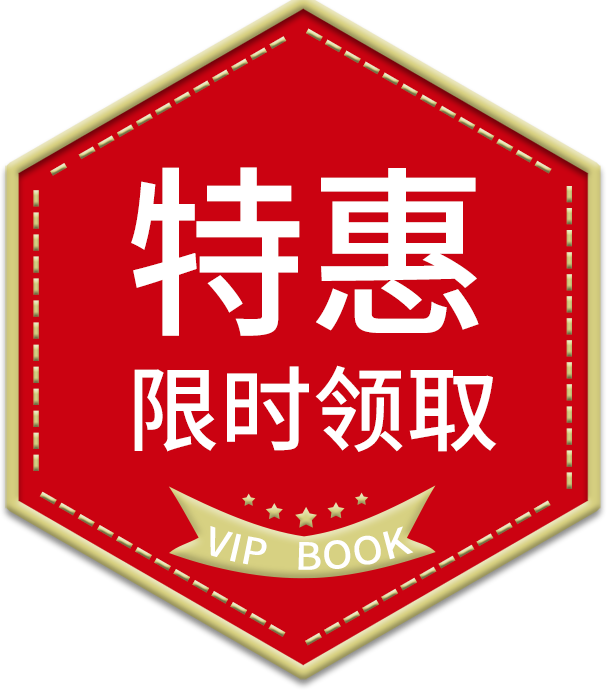类似推荐
编辑推荐
文史哲领域百余位国内外专家历时7年编译,向世界讲好中国故事。
内容简介
本书以学生和教师等群体为读者对象,为其研读、理解和翻译中华思想文化相关内容提供准确权威、正本清源的参考。
全书收录322条哲学类中华传统思想文化核心词,按中文条目拼音排序以便于查找,并附有多种索引以满足不同需求。
这些术语反映了中国传统文化特征和民族思维方式,体现了中国核心价值,编写者用易于口头表达、交流的简练语言客观准确地予以诠释,目的是在政府机构、社会组织、传播媒体等对外交往活动中,传播好中国声音,讲好中国故事,让世界更多了解中国国情、历史和文化。
作者简介
作者《中华思想文化术语》编委会,由袁济喜等人组成。
袁济喜,中国人民大学国学院教授,中国人民大学孔子研究院学术委员,北京大学美学与美育研究中心客座教授。
王博,北京大学副校长,教授,北京大学儒学研究院院长、道家研究中心主任。
聂长顺,武汉大学中国传统文化中心教授、日本研究中心学术企划部部长。
黄友义,曾任国际翻译家联盟副主席、外文局副局长兼总编辑、中国翻译协会秘书长,现任中国翻译协会副会长、全国翻译资格(水平)考试英语专家委员会主任。
章节目录
版权信息
“中华思想文化术语传播工程”专家团队 Scholars Participating in the Project “Key Concepts in Chinese Thought and Culture: Communication Through Translation”
“中华思想文化术语传播工程”秘书处 Secretariat of the Project “Key Concepts in Chinese Thought and Culture: Communication Through Translation”
前言
Foreword
出版说明
Publisher’s Note
安贫乐道/ānpín-lèdào/Be Content with a Simple but Virtuous Life
八卦/bāɡuà/Eight Trigrams
八音克谐/bāyīn-kèxié/Harmonious Combination of Eight Sounds
白马非马/báimǎ fēi mǎ/A White Horse Is Not a Horse.
保民/bǎomín/Protect the People
抱法处势/bàofǎ-chǔshì/Upholding Law by Means of Power
本末/běnmò/Ben and Mo (The Fundamental and the Incidental)
本无/běnwú/Benwu (Original Non-being)
变化/biànhuà/Change
别名/biémíng/Distinct Name
般若/bōrě/Prajna/Wisdom
博施济众/bóshī-jìzhòng/Deliver Extensive Benefits to the People and Relieve the Sufering of the Poor
不二/bù’èr/Advaya/Non-duality
不言之教/bùyánzhījiào/Influence Others Without Preaching
不真空/bùzhēnkōng/Emptiness as Non-substantiality
才/cái/Talent/Capability/Attribute
参验/cānyàn/Cross-checking and Verification
常/cháng/Constant Laws of Nature
称情立文/chēngqíng-lìwén/Establish Moral Standards in Keeping with Human Feelings
成人/chéngrén/Complete Man
诚/chéng/Sincerity
诚意/chénɡyì/Be Sincere in Thought
痴/chī/Obsessiveness/Ignorance/Perplexity
耻/chǐ/Shame
崇本举末/chóngběn-jǔmò/Revere the Fundamental and Keep the Specific Unchanged
崇本息末/chóngběn-xīmò/Revere the Fundamental and Dismiss the Specific
慈/cí/Kindness
达名/dámíng/Unrestricted Name
大节/dàjié/Major Principles
大体/小体/dàtǐ/xiǎotǐ/The Major Organ and the Minor Organs
大学/dàxué/Daxue (Great Learning)
大一统/dàyītóng/Great Unity
大丈夫/dàzhàngfu/Great Man
道/dào/Dao (Way)
道法自然/dàofǎzìrán/Dao Operates Naturally.
道问学/dào wènxué/Quest for Knowledge
道心/dàoxīn/Moral Mind/Moral Consciousness
德/dé/De (Virtue)
德性/déxìng/Virtuous Nature/Morals as Human Nature
德性之知/déxìnɡzhīzhī/Knowledge from One’s Moral Nature
地理/dìlǐ/The Laws Determining the Physical Features of the Land /Geography
动静/dònɡjìnɡ/Movement and Stillness
独化/dúhuà/Self-driven Development
兑/duì/Dui (Marsh)
二柄/èrbǐng/Two Handles
二谛/èrdì/Satyadvaya/Two Truths
法/fǎ/Law/Dharma
法身/fǎshēn/Dharmakāya/Body of Dharma
烦恼/fánnǎo/Kleśa/Affliction
反/fǎn/Reversal to the Opposite
反求诸己/fǎnqiúzhūjǐ/Introspection
反者道之动/fǎn zhě dào zhī dòng/The Only Motion Is Returning.
方便/fāngbiàn/Upāya/Expediency
非攻/fēiɡōnɡ/Denouncing Unjust Wars
非命/fēimìng/Rejection of Fatalism
分/fèn/Natural Attribute
风化/fēnghuà/Influence of Moral Cultivation
佛性/fóxìng/Buddhadhātu/Buddha-nature
福祸相倚/fúhuò-xiāngyǐ/Fortune and Misfortune Are Intertwined.
刚柔/ɡānɡróu/Toughness and Softness
刚柔相济/gāngróu-xiāngjì/Combine Toughness with Softness
刚毅/gāngyì/Firm and Resolute
革故鼎新/ɡéɡù-dǐnɡxīn/Do Away with the Old and Set Up the New
格物致知/ɡéwù-zhìzhī/Study Things to Acquire Knowledge
格义/géyì/Matching Meanings
艮/gèn/Gen (Mountain)
公私/gōngsī/Public and Private
共名/gòngmíng/General Name
寡欲/ɡuǎyù/Restraining Desires
卦爻/ɡuàyáo/Trigrams/Hexagrams and Component Lines
卦爻辞/guàyáocí/Hexagram Texts
观象/ɡuānxiànɡ/Observing Images
冠礼/guànlǐ/Cap Wearing Ceremony
光而不耀/ɡuānɡ’érbùyào/Bright but Not Dazzling
过犹不及/ɡuòyóubùjí/Going Too Far Is as Bad as Falling Short.
浩然之气/hàoránzhīqì/Noble Spirit
合同异/hé tóngyì/Unify Similarity and Difference
和/hé/Harmony
和而不同/hé’érbùtónɡ/Harmony but Not Uniformity
和实生物/hé shí shēng wù/Harmony Begets New Things.
洪范/hóngfàn/The Grand Rules
化性起伪/huàxìnɡ-qǐwěi/Transform Intrinsic Evil Nature to Develop Acquired Nature of Goodness
恍惚/huǎnghū/Intangible Existence
婚礼/hūnlǐ/Wedding Ceremony
浑沌/hùndùn/Chaos
几/jī/Ji(Omen)
积善成德/jīshàn-chénɡdé/Moral Character Can Be Built by Accumulating Goodness.
己所不欲,勿施于人/jǐsuǒbùyù, wùshīyúrěn/Do Not Do to Others What You Do Not Want Others to Do to You.
祭礼/jìlǐ/Sacrificial Ceremony
假名/jiǎmíng/Prajñapti/Designation
兼爱/jiān’ài/Universal Love
俭/jiǎn/Thriftiness
见利思义/jiànlì-sīyì/Think of Righteousness in the Face of Gain
见闻之知/jiànwénzhīzhī/Knowledge from One’s Senses
解蔽/jiěbì/Clear the Mind of Enigmas
尽心/jìnxīn/Exert One’s Heart/Mind to the Utmost
经/权/jīnɡ/quán/Constant and Temporary
经学/jīngxué/Classics Scholarship
精气/jīngqì/Vital Energy
净土/jìngtǔ/Sukhāvatīvyūha/Pure Land
静因之道/jìngyīnzhīdào/Governance by Being Aloof
绝地天通/jué dì tiān tōng/Keep Earthly and Heavenly Affairs Separate
君子/jūnzǐ/Junzi (Man of Virtue)
坎/kǎn/Kan (The Water Symbol)
克己复礼/kèjǐ-fùlǐ/Restrain Yourself and Follow Social Norms
空/kōng/Śūnyatā/Emptiness
孔颜之乐/Kǒnɡ-Yán zhī lè/The Happiness of Confucius and Yan Hui
苦/kǔ/Duhkha/Sufering
狂狷/kuángjuàn/Proactive Versus Prudent
坤/kūn/Kun (The Earth Symbol)
乐天知命/lètiān-zhīmìng/Rejoice in Complying with Heaven and Know Its Mandate
类名/lèimíng/Classified Name
离/lí/Li (The Fire Symbol)
离坚白/lí jiānbái/Separate Hardness from Whiteness
礼/lǐ/Li (Rites/Social Norms/Propriety)
理/lǐ/Li
理一分殊/lǐyī-fēnshū/There Is But One Li (Universal Principle), Which Exists in Diverse Forms.
力/lì/Strength/Capability
立中制节/lìzhōng-zhìjié/Determine the Proper Way for Expressing Human Feelings
利/lì/Interests/Gain
良知/liángzhī/Liangzhi (Conscience)
两仪/liǎngyí/Two Modes
临渊履薄/línyuān-lǚbó/Be Discreet as if Standing on Cliff Edge or Treading on Thin Ice
六艺/liùyì/The Six Arts
伦理/lúnlǐ/Ethics
轮回/lúnhuí/Saṃsāra/Rebirth/Reincarnation
矛盾/máodùn/Paradox of the Spear and the Shield/Contradiction
庙算/miàosuàn/Court Calculation
名实/mínɡshí/Name and Substance
明德/mínɡdé/Illustrious Virtue
明分使群/mínɡfèn-shǐqún/Proper Ranking Leads to Collaboration.
命/mìnɡ/Mandate/Destiny
木讷/mùnè/Simple and Sparing of Words
念佛/niànfó/Buddhānusmṛti/Recollection of the Buddha
涅槃/nièpán/Nirvana
判教/pànjiào/Classification of Teachings
聘礼/pìnlǐ/Pinli (Diplomatic Etiquette and Protocol)
菩提/pútí/Bodhi
齐物/qíwù/See Things as Equal
奇正/qízhèng/Qi or Zheng (Surprise or Normal)
气/qì/Qi (Vital Force)
气质之性/qìzhìzhīxìng/Character Endowed by Qi (Vital Force)
器/qì/Qi (Vessel)
前识/qiánshí/Foreknowledge/Prophecy
乾/qián/Qian
亲亲/qīnqīn/Affection for One’s Kin
亲知/qīnzhī/Knowledge from Personal Experience
情/qíng/Qing
穷理尽性/qiónglǐ-jìnxìng/Explore the Nature of All Things
穷则变,变则通,通则久/qióng zé biàn, biàn zé tōng, tōng zé jiǔ/Extreme – Change – Continuity
求放心/qiú fànɡxīn/Search for the Lost Heart
人副天数/rénfùtiānshù/Humanity Should Be Aligned with Nature.
人伦/rénlún/Human Relations
人心/rénxīn/Human Heart/Human Desires
仁/rén/Ren (Benevolence)
仁政/rénzhèng/Benevolent Governance
如来藏/rúláizàng/Tathāgatagarbha/Womb of the Tathāgata
三表/sānbiǎo/Three Standards
三才/sāncái/Three Elements
三界/sānjiè/Traidhātuka/Three Realms of Existence
三思而行/sānsī’érxínɡ/Think Carefully Before Taking Action
三省吾身/sānxǐng-wúshēn/Reflect on Oneself Several Times a Day
三玄/sānxuán/Three Metaphysical Classics
丧礼/sānglǐ/Mourning Rites
色/sè/Rūpa/Matter
上兵伐谋/shàngbīng-fámóu/The Best Strategy in Warfare is to Foil the Enemy’s Strategy.
尚同/shàngtóng/Conform Upwardly
尚贤/shàngxiǎn/Exalt the Worthy
舍生取义/shěshēng-qǔyì/Give One’s Life to Uphold Righteousness
射礼/shèlǐ/Rites of Archery
神/shén/Shen (Spirit/Spiritual)
慎独/shèndú/Shendu
慎思明辨/shènsī-míngbiàn/Careful Reflection and Clear Discrimination
慎终追远/shènzhōng-zhuīyuǎn/Mourn the Deceased and Memorialize Those Long Gone
生生/shēngshēng/Perpetual Growth and Change
圣/shèng/Sage/Sageness
圣人/shèngrén/Sage
师法之化/shīfǎzhīhuà/Enlightenment Through Education
时/shí/Time/Timing
时中/shízhōng/Follow the Golden Mean
识/shí/Vijñāna/Consciousness
实相/shíxiàng/Bhūtatathatā/True Suchness
世异事异/shìyì-shìyì/When Times Change, So Do Social Conditions.
势/shì/Situation/Trend
恕/shù/Being Considerate/Forgiveness
率性/shuàixìng/Acting in Accordance with Human Nature
说知/shuōzhī/Knowledge from Explanation
私名/sīmíng/Private Name
思/sī/Reflecting/Thinking
四端/sìduān/Four Initiators
四书/sìshū/Four Books
四象/sìxiàng/Four Images
素位而行/sùwèi’érxínɡ/Do What Is Proper for Your Situation
太极/tàijí/Taiji (The Supreme Ultimate)
太虚/tàixū/Taixu (Great Void)
体用/tǐyòng/Ti and Yong
悌/tì/Fraternal Duty
天/tiān/Tian (Heaven)
天道/tiāndào/Way of Heaven
天经地义/tiānjīng-dìyì/Natural Rules and Orderliness
天籁/tiānlài/Sounds of Nature
天理/tiānlǐ/Natural Law/Principles of Heaven
天命/tiānmìnɡ/Mandate of Heaven
天命靡常/tiānmìng-mǐcháng/Heaven-bestowed Supreme Power Is Not Eternal.
天命之性/tiānmìngzhīxìng/Character Endowed by Heaven
天人感应/tiānrén-gǎnyìng/Nature and Humans Respond to Each Other.
天人合一/tiānrén-héyī/Heaven and Man Are United as One.
天人之分/tiānrénzhīfēn/Distinction Between Man and Heaven
天文/tiānwén/The Laws of Constellations and Seasons/Astronomy
同归殊途/tónɡɡuī-shūtú/Arrive at the Same Destination via Different Routes/Rely on a Common Ontological Entity
推恩/tuī’ēn/Extend Benevolence and Love
推己及人/tuījǐ-jírén/Put Oneself in Another’s Place
为仁由己/wéirén-yóujǐ/Readily Practice Benevolence and Virtue
为己之学/wèijǐzhīxué/Learning for Self-improvement
文质/wénzhì/Form and Content
闻知/wénzhī/Knowledge from Hearsay
无常/wúcháng/Anitya/Impermanent
无为/wúwéi/Non-action
无我/wúwǒ/Anātman/Egolessness
无用之用/wúyònɡzhīyònɡ/The Advantage of Appearing Useless
五经/wǔjīnɡ/Five Classics
五伦/wǔlún/The Five Bonds
五行/wǔxíng/Wuxing
五行相生/wǔxíng-xiāngshēng/The Five Elements, Each in Turn Producing the Next
五行相胜/wǔxíng-xiāngshèng/The Five Elements Triumph over Each Other.
物/wù/Wu (Thing/Matter)
物化/wùhuà/Transformation of Things
物极必反/wùjí-bìfǎn/When Reaching an Extreme, Things Are Bound to Revert to Their Opposites.
习/xí/Practice
贤人/xiánrén/Person of Integrity
见素抱朴/xiànsù-bàopǔ/Maintain Originality and Embrace Simplicity
乡饮酒礼/xiāngyǐnjiǔlǐ/Banquet for Community Leaders and Rural Elders
乡愿/xiāngyuàn/Hypocrite
相反相成/xiānɡfǎn-xiānɡchénɡ/Being both Opposite and Complementary
象/xiànɡ/Xiang (Semblance)
象数/xiànɡshù/Emblems and Numbers
逍遥/xiāoyáo/Carefree
消息/xiāoxī/Wax and Wane
小节/xiǎojié/Minor Principles
小人/xiǎorén/Petty Man
孝/xiào/Filial Piety
絜矩之道/xiéjǔzhīdào/Principle for the Application of Rules and Norms
心/xīn/Heart/Mind
心术/xīnshù/The Art of the Mind
心悦诚服/xīnyuè-chénɡfú/Be Completely Convinced and Follow Willingly
心斋/xīnzhāi/Pure State of the Mind
心知/xīnzhī/Mind Cognition
信/xìn/Good Faith
行己有耻/xíngjǐ-yóuchǐ/Conduct Oneself with a Sense of Shame
行先知后/xínɡxiān-zhīhòu/First Action, Then Knowledge
形而上/xínɡ’érshànɡ/What Is Above Form/The Metaphysical
形而下/xínɡ’érxià/What Is
中华思想文化术语:哲学卷(中英对照)是2021年由外语教学与研究出版社出版,作者《中华思想文化术语》编委会。
得书感谢您对《中华思想文化术语:哲学卷(中英对照)》关注和支持,如本书内容有不良信息或侵权等情形的,请联系本网站。

















